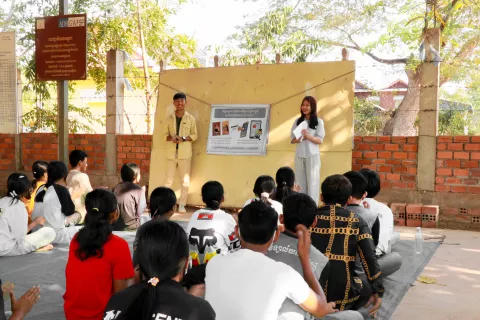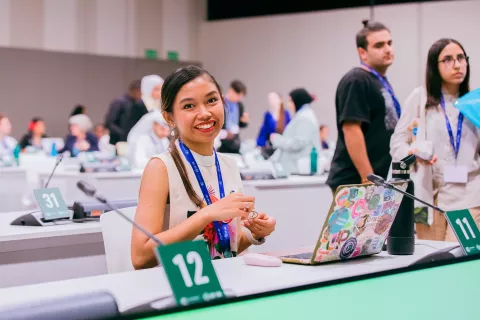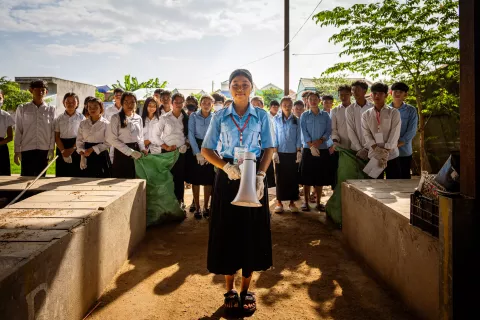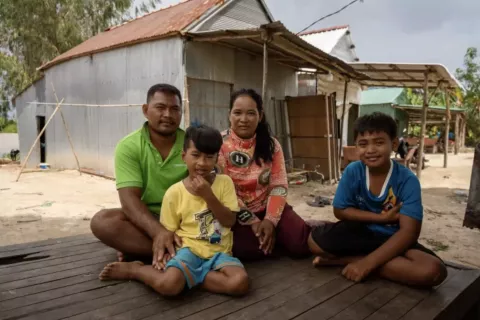Without a doubt we are seeing a new wave of youth activism around the world. While it was previously limited to school grounds at best, young people are now finding new platforms to speak out about some of society’s most pressing and urgent issues. Twelve-year-old Ralyn Saitdtanasarn, or Lilly for short, is one such activist campaigning for an end to single-use plastics in Thailand. Her aim is clear:
“Just as it’s a social norm to be polite, I want to make it a social norm to stop using plastics.”
Lily started campaigning at only 8 years old and it has since been an inspiring journey. “What really got me started was a holiday at the beach where there was loads of trash everywhere and I wanted to pick it up,” says Lilly. “But I knew that the next day there would be the same amount of plastic there again.”

Since then, Lilly has been lobbying an impressive list of high-profile company executives and government officials. Today, she is working closely with the Ministry of Education in Thailand to develop courses centered around ecosystems and how human society impacts them.
But it hasn’t been an easy journey.
The initial reactions from company leaders and government officials were mainly ones of confusion, and Lilly and her friends quickly understood that the key to being heard lies in perseverance and creativity. “I focus on people who have power because I like to think of it as a pyramid effect that will slowly trickle down and bring about change,” Lilly says.
“At first they thought I was lost, but what I do is I stay at the ministries for a long time with a bunch of signs so my message gets heard. My friends and I would just stay there, write them messages and annoy them until they finally had to do something”.
Three crucial trends shaping youth activism today
Lilly points to three crucial trends that are shaping today’s growing youth activism.
“It’s easy for people to get online and find information,” she says. This exposure to information means that children now form opinions on an increasingly broad range of issues.
Secondly, the growth of social media provides youth an easier way to share their knowledge, thoughts, and passions with peers. This expands the potential sphere of influence a young person has; from school to friends and family, to the entire world.
Finally, Lilly says that this easy access to information also reveals the problems and injustices going on in the world, and the lack of action happening to tackle them.
Young people are increasingly fed up with the lack of timely progress on a wide range of issues, but now they are able to make their voices heard, and able to grow support with like-minded people.

Inspiring change
Lilly’s meeting with UNICEF, where she spoke about her work and efforts to eradicate single-use plastics, was an inspiring moment. All too often adults downplay the voice of youth activists, blaming their lack of experience, naivety, and innocence. In reality, they are strong qualities that should be acknowledged and valued.
On several occasions, Lilly pointed out how essential the support from her parents has been.
In general, adults arguably have two main responsibilities when it comes to empowering youth. On the one hand, they need to cultivate and support the notion that youth hold the power to kick-start important discussions and initiate change.
On the other hand, as adults we need to preserve children’s innocence and ignite their passions. They will likely live up to what we believe of them in the future. Together with that comes the need to truly listen to them and not to discredit them. Indeed, it’s a true blessing that children typically remain unencumbered by “real-world” burdens such as financial security, stable employment and more, as it allows them to think free of society’s metaphorical shackles.

Philosophically speaking, youth are able to spend their time thinking and advocating about how the world should be, without any “reality bias”. They remain unconstrained, uncorrupted, and isolated from many of our modern world’s crudest realities. Acknowledging that their innocence represents an invaluable asset, the voice of the young should increasingly be taken as a compass for political, economic, social, and environmental development.
“Change is not your enemy,” she says with confidence. “It’s been happening for thousands of years. We should not be afraid of changing something because we think it’s the safest option, or we think we’re already used to it. It might be scary at first, but we can always work together to make the change successful”.
As adults, we should be reminded of this more often.
About the author:
Siri Luther is Communication Officer at UNICEF EAPRO






